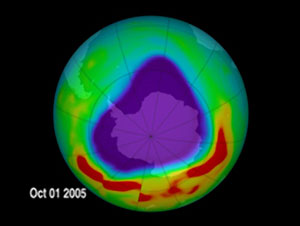Ozone ban has been effective in fighting global warming
Ozone ban has been more effective in fighting global warming than Kyoto Protocol
mongabay.com
March 5, 2007
The 1987 Montreal Protocol, which restricted the use of ozone-depleting substances, has helped slow the rate of global warming in addition to protecting the ozone layer, report scientists writing in a paper published online in the early edition of PNAS.
Signed in 1987, the Montreal Protocol on Substances that Deplete the Ozone Layer is an international treaty that limited production of ozone-depleting substances like chlorofluorocarbon compounds (CFCs) known as “freons” and bromofluorocarbon compounds known as Halons. These compounds are also known to be greenhouse gases dozens of times more potent than carbon dioxide.
Guus Velders of the Netherlands Environmental Assessment Agency and colleagues report that without the reductions achieved under the Montreal Protocol, the amount of heat trapped by the atmosphere due to ozone-depleting substances would be roughly twice as high as it is today. The authors say “the savings in trapped heat are equivalent to about 10 years of growth in carbon dioxide concentrations” and note that the “climate protection already achieved by the Montreal Protocol alone is far larger than the reduction target of the first commitment period of the Kyoto Protocol.”
 This still image is from an animation that zooms down to Antarctica and shows the daily ozone readings from July 1, 2005 to October 25,2005. Credit: NASA |
Velders and colleagues argue that amendments to the Montreal Protocol, especially in the absence of a functional Kyoto Protocol, could further help fight global warming
CITATION: Vilders, G.J. et al (2007). The importance of the Montreal Protocol in protecting climate. PNAS Early Edition. March 9, 2007.
Related Article
Ozone loss hits record in 2006. The European Space Agency (ESA) said that ozone loss in Antarctica hit a record in 2006. ESA reports that ozone measurements made by the Envisat satellite showed the ozone loss of 40 million tons of ozone, a level exceeding the previous record ozone loss of about 39 million tonnes for 2000.







